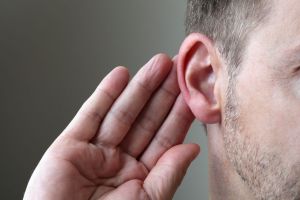|
www.HealthyHearing.com |
Diplacusis: Understanding 'double' hearingWhy some people hear different pitches or echoes
Contributed by Emily Ostrowski, content manager, Healthy Hearing Key points:
For most people, our ears work together, delivering sounds as one "unit" to our brain. Even if the ears perceive slightly different pitches, our brain still can interpret it as the same source of sound. This is similar to how our eyes work—we see one visual field, instead of two. However, just as people can experience double vision, people can also experience double hearing. What is double hearing?The medical term for double hearing is diplacusis binauralis. People with this condition perceive one sound as two distinct pitches. It may or may not be accompanied by tinnitus, or ringing in the ears. As you can imagine, this sensation can be disturbing and troubling to those who experience it. It can affect anyone, but having certain conditions make it more likely to occur. .jpg)
Double hearing can occur in both ears or it can affect just one ear, which is known as diplacusis monauralis. More commonly, though people notice a problem with both ears, known as diplacusis binauralis. When you hear the same sound differently in each ear, it's usually related to pitch or timing. One ear may hear a sound at a different pitch and speed than the other ear. Two main types of diplacusisThere are two subtypes of diplacusis binauralis:
What causes it?Diplacusis can be a symptom of an underlying hearing or ear issue. 1. Hearing loss that's worse in one earTwo types of hearing loss are especially linked to diplacusis:
A 2016 study found that while hearing loss in general increased the likelihood of double hearing, it was most significant in people with asymmetrical hearing loss. 2. Sensorineural hearing lossSensorineural hearing loss is the most common type of hearing loss.It affects both ears evenly. It's often caused by aging or exposure to loud noise. Hearing loss can change the way you perceive sound frequencies, leading to diplacusis. 3. Obstructions in the earA blockage in the ear can alter sound perception and cause changes in hearing. Often times, once the blockage is removed, any hearing abnormalities will resolve. Potential obstructions or similar issues include:
4. Head or ear traumaHead or ear injuries can damage the inner ear structures (like the cochlea or auditory nerve) or disrupt sound processing in the brain. This may cause you to perceive the same sound at different pitches or frequencies. 5. Other causesAdditionally, double hearing may be the result of taking medications that are ototoxic (meaning they can damage the ear or vestibular disorders like Meinere's disease. Musicians and diplacusisSome research has indicated that musicians may be more likely to experience double hearing. A 2018 study found that classical musicians were more likely to report diplacusis than pop/rock musicians or non-musicians. Musicians may be more vulnerable because they are at a higher risk of noise-induced hearing loss. They are also more inclined to notice symptoms as their ears are more sensitive to pitch and tone. 
unique type of hearing condition. Treatment optionsThe type of treatment you receive will depend on the cause, and may be a simple fix. For example, if your diplacusis is caused by an obstruction like earwax buildup or fluid from and infection, your hearing may return to normal once the obstruction is removed or the infection subsides. If your double hearing is related to hearing loss, hearing aids may help you both hear better and balance sound input in both ears. Customized settings can help meet your individual hearing loss needs and can work to compensate for any asymmetrical hearing loss. In cases of severe or profound hearing loss, cochlear implants may be recommended. Other management techniques may involve:
How to get help for diplacusisIf you notice double hearing, promptly schedule a visit with a hearing healthcare or ENT physician. They will evaluate your symptoms and will likely conduct a hearing test to determine if any issues are present and may also do additional testing like and auditory brainstem response (ABR) to check for any issues with the inner ear or auditory nerve that could be causing the distortion. Visit our directory of consumer-reviewed hearing clinics to find a hearing aid specialist or audiologist near you. Emily Ostrowski, content manager, Healthy Hearing
Related Help Pages:
Hearing loss Causes Treatment Cochlear implants Tinnitus (ringing in the ears) Meniere's disease
|
Featured clinics near me
Earzlink Hearing Care - Reynoldsburg
7668 Slate Ridge Blvd
Reynoldsburg, OH 43068

Find a clinic
Need a hearing test but not sure which clinic to choose?
Call 1-877-872-7165 for help setting up a hearing test appointment.


 Emily is an experienced journalist and medical content writer based in Maine. Passionate about delivering enlightening and accurate content, she is committed to empowering people to make informed choices regarding their hearing health.
Emily is an experienced journalist and medical content writer based in Maine. Passionate about delivering enlightening and accurate content, she is committed to empowering people to make informed choices regarding their hearing health.